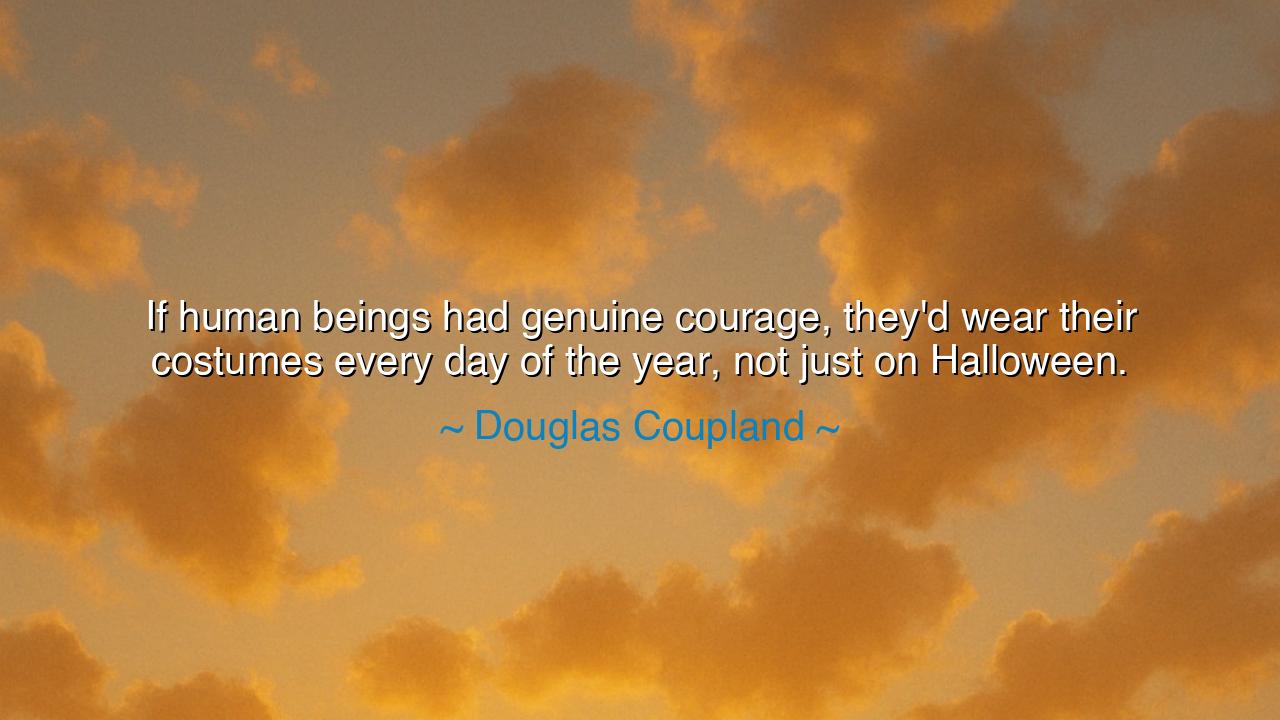
If human beings had genuine courage, they'd wear their costumes
If human beings had genuine courage, they'd wear their costumes every day of the year, not just on Halloween.






When Douglas Coupland wrote, “If human beings had genuine courage, they'd wear their costumes every day of the year, not just on Halloween,” he was not speaking of masks and makeup alone, but of truth—the truth of who we are beneath the expectations of the world. His words are a playful jest on the surface, yet beneath them lies a profound challenge: that true courage is not the absence of fear, but the willingness to reveal the self unhidden, unfiltered, unashamed. The costume, in Coupland’s vision, is not mere disguise—it is the expression of our secret selves, the dreams and desires we hide to please others. To wear it every day is to live in authenticity, to walk the earth without the armor of conformity.
Douglas Coupland, the Canadian novelist who gave voice to Generation X, often wrote of alienation in a world obsessed with appearances. His words spring from the modern soul’s quiet exhaustion—the pressure to seem rather than to be. On Halloween, he notes, people dare to dress as who they wish—monsters, heroes, queens, fools. It is the one night when society allows imagination to triumph over inhibition. But what if, he asks, we carried that same spirit into the rest of the year? What if we had the courage to live as the people we pretend to be when we are finally free from judgment? In that question lies his lament for a humanity that hides its light beneath the heavy cloak of fear.
The costume in Coupland’s quote is a metaphor for authenticity, for all that is wild, creative, or vulnerable within us. We wear masks each day—of politeness, of professionalism, of restraint—to fit the shape the world demands. Yet the soul longs to breathe, to be seen in its strangeness, its color, its fire. The ancient Greeks spoke of the persona, the mask actors wore on stage. But they also warned that when a man forgets that his mask is only a role, he loses himself. Coupland’s wisdom echoes that ancient truth: we have mistaken performance for life, and forgotten how to be real.
Consider the story of Frida Kahlo, the artist who refused to wear the masks society offered her. Through pain, illness, and betrayal, she turned her suffering into art and her art into identity. She dressed in bright Tehuana dresses, adorned herself with flowers, and painted her own image again and again—not as the world saw her, but as she felt herself to be. Frida wore her “costume” every day, not to hide, but to declare: This is who I am. Her life, fierce and unyielding, shows the power of courageous authenticity—to live boldly, without apology, is its own form of art.
Coupland’s insight also holds a mirror to fear itself. We fear judgment, rejection, ridicule—yet these are shadows cast by our own insecurity. The costume, when worn with honesty, is liberation. It is the breaking of chains forged by other people’s opinions. The one who has “genuine courage,” as Coupland says, is not the loudest or the strongest, but the one who refuses to lie about who they are. It takes greater bravery to live as oneself than to conquer armies, for it means standing alone against the tide of expectation. The world honors conformity but secretly envies those who are free.
In every age, those who changed the world did so because they had the courage to “wear their costumes.” Socrates dared to think differently and drank the hemlock rather than betray his truth. Galileo looked at the stars and spoke the truth that the heavens revolved not around man, but around the sun. Rosa Parks, weary after a long day, refused to surrender her seat, revealing that courage can be as simple—and as world-shaking—as saying “no.” Each of these souls refused the disguise of silence. They walked the earth clothed in conviction, bearing the ridicule of their time, yet lighting a torch for all who would come after.
So, my children of the hidden fire, take Coupland’s words as both challenge and blessing. Do not wait for the safety of the masquerade to reveal your heart. Do not spend your life editing your soul to suit another’s comfort. Put on your “costume”—the wild truth of who you are—and wear it proudly. Let your courage be your adornment, and your authenticity your light. For life is too brief, and too precious, to be lived as a shadow.
And when the world looks upon you with confusion or scorn, remember: the ones who dare to be themselves become the ones who teach others how to live. As Douglas Coupland reminds us, if we had genuine courage, we would wear our costumes every day—not to hide, but to reveal the beauty we have always kept within. Therefore, live boldly. Show the colors of your spirit. For the bravest act of all is simply this—to be yourself, unmasked, in a world that has forgotten how.






AAdministratorAdministrator
Welcome, honored guests. Please leave a comment, we will respond soon